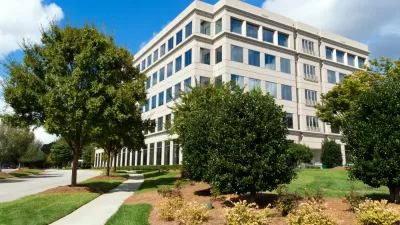A recent spate of reports has examined the up-and-down U.S. economy and predicted the need for more office space to fuel the growing workforce.

"Though economic boosts this week were brought on by strong corporate earnings reports, continued job growth in the high tech sector has been the main catalyst to the resurgence of the U.S. office sector," according to an article by Robert Carr.
The article bases that conclusion on data found in the July Beige Book report by the U.S. Federal Reserve Board, which shows continued payroll growth, and a "Friday Market Insight Report" from Newmark Grubb Knight Frank, which also showed job growth in June moving at "lightning speed."
Carr explores the job data's implications for office real estate, finding an expert willing to argue strongly for the continued growth of the tech industry's influence in the market:
Technology talent is fueling most of the office use growth, says Colin Yasukochi, director of research and analysis for the Northern California region with real estate services firm CBRE. He recently authored the “2016 Scoring Tech Talent” report for the company. High tech companies’ share of major leasing activity increased from 11.0 percent in 2011 to 18.0 percent in 2015 nationwide, he notes—the largest single share of any industry. The number of tech talent workers in the labor force increased 27.0 percent during the past five years, adding more than one million jobs to the national economy, at more than three times the national average for all occupations.
According to Yasukochi, traditional tech cities like San Francisco, Washington, D.C., New York, Seattle, and Austin will continue to lead the country's tech job market, but new arrivals to the scene, like Nashville, Charlotte, Tampa, Seattle, and Phoenix, will also be faced with growing demand for office space.
FULL STORY: Tech Workers Control Current Office Market Patterns

Planetizen Federal Action Tracker
A weekly monitor of how Trump’s orders and actions are impacting planners and planning in America.

The Simple Legislative Tool Transforming Vacant Downtowns
In California, Michigan and Georgia, an easy win is bringing dollars — and delight — back to city centers.

San Francisco's School District Spent $105M To Build Affordable Housing for Teachers — And That's Just the Beginning
SFUSD joins a growing list of school districts using their land holdings to address housing affordability challenges faced by their own employees.

In More Metros Than You’d Think, Suburbs are Now More Expensive Than the City
If you're moving to the burbs to save on square footage, data shows you should think again.

The States Losing Rural Delivery Rooms at an Alarming Pace
In some states, as few as 9% of rural hospitals still deliver babies. As a result, rising pre-term births, no adequate pre-term care and "harrowing" close calls are a growing reality.

The Small South Asian Republic Going all in on EVs
Thanks to one simple policy change less than five years ago, 65% of new cars in this Himalayan country are now electric.
Urban Design for Planners 1: Software Tools
This six-course series explores essential urban design concepts using open source software and equips planners with the tools they need to participate fully in the urban design process.
Planning for Universal Design
Learn the tools for implementing Universal Design in planning regulations.
Smith Gee Studio
City of Charlotte
City of Camden Redevelopment Agency
City of Astoria
Transportation Research & Education Center (TREC) at Portland State University
US High Speed Rail Association
City of Camden Redevelopment Agency
Municipality of Princeton (NJ)




























